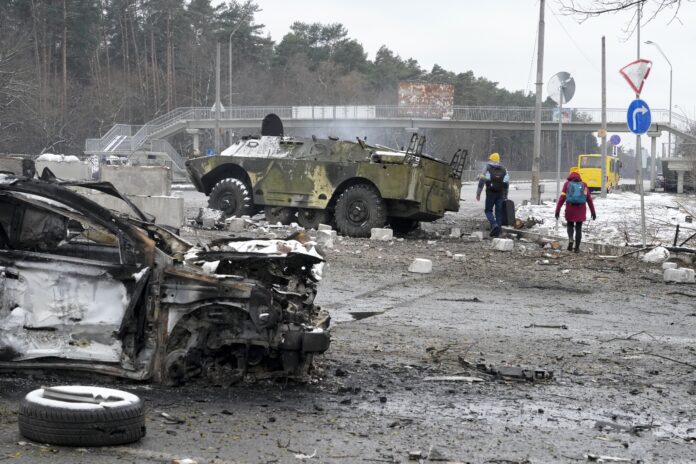The Canadian government is committing an additional $100 million in humanitarian assistance for Ukraine as its war with Russia rages on.
Furthermore, Ottawa is planning to ban Russian-owned or registered ships and fishing vessels from entering Canadian ports and internal waters.
The new measures announced on Tuesday come as the conflict in Eastern Europe continues for its sixth day with no end in sight.
The $100 million in additional humanitarian assistance Ottawa announced will be distributed among “experienced partners” to address the most urgent humanitarian needs on the ground in Ukraine and neighbouring countries.
“This support will help provide emergency health services (including trauma care), protection, support to displaced populations and essential life-saving services such as shelter, water and sanitation, and food,” the government said in a news release.
The war, which began last Thursday after Russian President Vladimir Putin ordered a full-scale assault on Ukraine, has resulted in roughly 677,000 refugees attempting to flee the country, the United Nations said Tuesday.
Fight rages in Ukraine as families flee
Meanwhile, Russian shelling and bombing have already damaged water pipes, electricity lines and basic services, it added.
The UN has launched an emergency appeal to the tune of $1.7 billion in humanitarian aid for people attempting to flee Ukraine and resettle.
So far, Canada has allocated an additional $25 million in humanitarian assistance to Ukraine since the start of the year. It includes $15 million for experienced humanitarian partners in Ukraine, and up to $10 million to the Canadian Red Cross through the matching fund for its Ukraine Humanitarian Crisis Appeal.
Trending Stories
Satellite photos show Russian military convoy over 60 km long headed toward Kyiv
Man shoots and kills his 3 children, chaperone, himself at California church
Furthermore, Canada has offered up to $620 million in sovereign loans to support Ukraine’s economy.
After closing its airspace to Russian flights over the weekend, Canada is now planning to deny Russian-owned or registered ships and fishing vessels from entering Canadian ports and internal waters.
The ban is expected to take effect later this week through orders made pursuant to the Special Economic Measures Act, the government said.
“President Putin’s war on Ukraine is a war on freedom, on democracy, and on the rights of Ukrainians. These acts, which carry profound human consequences, will not go unpunished,” said Joyce Murray, minister of fisheries, oceans and the Canadian Coast Guard, in a news release Tuesday.
“The Canadian Coast Guard and its members will be there to support on-water law enforcement partners. Canada and our allies will continue to stand with Ukraine and its people.”
The European Union is also considering a ban on Russian ships entering the bloc’s ports. The United Kingdom on Monday closed its ports to vessels that are Russian-flagged or believed to be registered, owned or controlled by any person connected with Moscow.
Canada’s latest measures against Russia are in line with its promise to continue imposing penalties against Moscow for starting a war with Ukraine.
Furthermore, Canada continues to support Ukraine in its fight with weapons shipments, the latest of which was announced on Monday.
Canada will send anti-tank weapons and upgraded ammunition to Ukrainian forces. Ottawa previously sent $7.8-million worth of lethal aid to Ukraine, but has been pressed over whether the government would do more amid the bloody Russian push into the country.
Russia calls its actions in Ukraine a “special operation” that it says is not designed to occupy territory, but to destroy its southern neighbour’s military capabilities and capture what it regards as dangerous nationalists.
In the weeks leading up to the war, Moscow had built up roughly 150,000 troops near the border, and continuously denied Western accusations it was planning an invasion of Ukraine.
— with files from Amanda Connolly and Reuters.
© 2022 Global News, a division of Corus Entertainment Inc.



